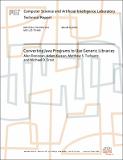Converting Java Programs to Use Generic Libraries
Author(s)
Donovan, Alan; Kiezun, Adam; Tschantz, Matthew S.; Ernst, Michael D.
DownloadMIT-CSAIL-TR-2004-015.ps (38.07Mb)
Additional downloads
Other Contributors
Program Analysis
Metadata
Show full item recordAbstract
Java 1.5 will include a type system (called JSR-14) that supports parametric polymorphism, or generic classes. This will bring many benefits to Java programmers, not least because current Java practice makes heavy use of logically-generic classes, including container classes.Translation of Java source code into semantically equivalent JSR-14 source code requires two steps: parameterization (adding type parameters to class definitions) and instantiation (adding the type arguments at each use of a parameterized class). Parameterization need be done only once for a class, whereas instantiation must be performed for each client, of which there are potentially many more. Therefore, this work focuses on the instantiation problem. We present a technique to determine sound and precise JSR-14 types at each use of a class for which a generic type specification is available. Our approach uses a precise and context-sensitive pointer analysis to determine possible types at allocation sites, and a set-constraint-based analysis (that incorporates guarded, or conditional, constraints) to choose consistent types for both allocation and declaration sites. The technique handles all features of the JSR-14 type system, notably the raw types that provide backward compatibility. We have implemented our analysis in a tool that automatically inserts type parameters into Java code, and we report its performance when applied to a number of real-world Java programs.
Date issued
2004-03-30Other identifiers
MIT-CSAIL-TR-2004-015
MIT-LCS-TR-940
Series/Report no.
Massachusetts Institute of Technology Computer Science and Artificial Intelligence Laboratory